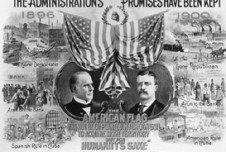After the longest and most expensive presidential campaign in the history of our country, on Election Day this year American voters will return to a simple question: Whom do you trust?
Indeed, as Anna Abramson suggests in her article on page 30 of this issue, political campaigns are fundamentally battles to win voters’ trust, and that has no doubt been the case this year. At a time of economic crisis and widespread political scandal, Senators John McCain and Barack Obama have explicitly tried to position themselves as the candidate capable of restoring Americans’ confidence in their leaders.
But this election year has also underscored the primacy of trust in most every aspect of our lives. It’s trust that keeps our marriages stable, our government functioning, and our money safe in the bank. It’s trust that nurtures the bond between parents and children. As researcher Michael Kosfeld explains in his essay, biological mechanisms like oxytocin prime human beings to trust each other; in laboratory experiments, says Kosfeld, trust is the norm, not the exception. Knowing that humans are, in effect, wired to trust one another helps explain why we so often go out on a limb to trust friends, colleagues, and even strangers.
Unfortunately, that natural state of trust can be undermined and even destroyed. Studies show that for decades, long before the current round of fiscal and political debacles, Americans’ trust in their institutions and each other has been wavering, often with good reason. In their essay, sociologist Pamela Paxton and Greater Good Senior Editor Jeremy Adam Smith catalogue these declines in trust, trace their origins, and reveal the potentially devastating effects they can have.
But Paxton, Smith, and other contributors to this issue do more than highlight the importance of trust and the harm that can come from its decay. They offer concrete prescriptions for building trust in our relationships and our country as a whole.
Drawing on years of clinical experience, psychologist Joshua Coleman outlines steps couples can take to re-establish trust after one partner has betrayed the other. In a candid, probing conversation with his daughter Eve, world-renowned psychologist (and Greater Good editorial board member) Paul Ekman, a leading expert on lying and deception, explains how to raise children who are both trusting and trustworthy. In this issue’s Q&A, noted cognitive scientist and author Steven Pinker discusses how the scientific community can preserve its credibility, despite recent political attacks.
And in their lead essay, Paxton and Smith describe how we can restore trust in some of this country’s most discredited institutions—from the banking industry to the White House—and how restoring trust in these institutions can promote trust between individuals and across social groups.
This is not to overlook the limits of trust. In fact, essays in this issue note that a healthy dose of skepticism often serves to keep others honest and protect ourselves from harm. But these essays also recognize the corrosive powers of distrust. For too long, we’ve witnessed a vicious cycle of selfishness, distrust, greed, and cynicism in this country, with distrust actually serving to normalize and perpetuate untrustworthy behavior. As our nation sets its path for the next four years, this issue of Greater Good makes clear that it’s within our power to break this cycle and give one another good reason to trust again.






Comments